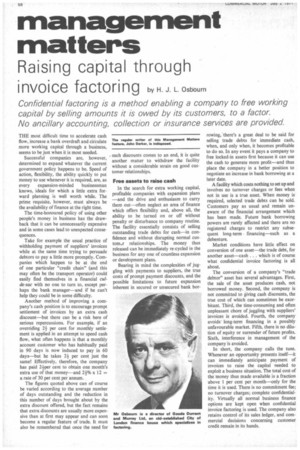management matters
Page 58

If you've noticed an error in this article please click here to report it so we can fix it.
Raising capital through
invoice factoring by H. J. L. Osbourn
Confidential factoring is a method enabling a company to free working capital by selling amounts it is owed by its customers, to a factor.
No ancillary accounting, collection or insurance services are provided.
THE most difficult time to accelerate cash flow, increase a bank overdraft and circulate more working capital through a business, seems to be just when it is most needed.
Successful companies are, however, determined to expand whatever the current government policy happens to be. Speed of action, flexibility, the ability quickly to put money to use whenever it is required, are, as every expansion-minded businessman knows, ideals for which a little extra forward planning is well worth while. The prime requisite, however, must always be the availability of finance at the right time.
The time-honoured policy of using other people's money in business has the drawback that it can be unnecessarily expensive and in some cases lead to unexpected consequences.
Take for example the usual practice of withholding payment of suppliers' invoices while at the same time trying to persuade debtors to pay a little more promptly. Companies which happen to be at the end of one particular "credit chain" (and this may often be the transport operator) could easily find themselves in a financial culde-sac with with no one to turn to, except perhaps the bank manager—and if he can't help they could be in some difficulty.
Another method of improving a company's cash position is to encourage prompt settlement of invoices by an extra cash discount—but there can be a risk here of serious repercussions. For example, if an overriding 2+ per cent for monthly settlement is applied in an attempt to speed cash flow, what often happens is that a monthly account customer who has habitually paid in 90 days is now induced to pay in 60 days—but he takes 2+ per cent just the same! Effectively, therefore, the company has paid 2+per cent to obtain one month's extra use of that money—and 2+96.x 12 = a rate of 30 per cent per annum.
The figures quoted above can of course be varied according to the average number of days outstanding and the reduction in this number of days brought about by the extra discount offered, but the fact remains that extra discounts are usually more expensive than at first may appear and can soon become a regular feature of trade. It must also be remembered that once the need for such discounts comes to an end, it is quite another matter to withdraw the facility without a considerable strain on good customer relationships.
Free assets to raise cash In the search for extra working capital, profitable companies with expansion plans —and the drive and enthusiasm to carry them out—often neglect an area of finance which offers flexibility and, above all, the ability to be turned on or off without penalty or disturbance to company routine. The facility essentially consists of selling outstanding trade debts for cash—in confidence and without disrupting normal customa relationships. The money thus released can be immediately re-cycled in the business for any one of countless expansion or development plans.
Bearing in mind the complexities of juggling with payments to suppliers, the true costs of prompt payment discounts, and the possible limitations to future expansion inherent in secured or unsecured bank bor rowing, there's a great deal to be said for selling trade debts for immediate cash, when, and only when, it becomes profitable to do so. In any event it pays a company to free locked-in assets first because it can use the cash to generate more profit—and thus place the company in a better position to negotiate an increase in bank borrowing at a later date.
A facility which costs nothing to set up and involves no turnover charges or fees when not in use is a true asset. When money is required, selected trade debts can be sold. Customers pay as usual and remain unaware of the financial arrangement which has been made. Future bank borrowing powers are rarely affected and there are no registered charges to restrict any subsequent long-term financing—such as a debenture.
Market conditions have little effect on conversion of one asset—the trade debt, for another asset—cash . . . which is of course what confidential invoice factoring is all about.
The conversion of a company's "trade debtor" asset has several advantages. First, the sale of the asset produces cash, not borrowed money. .Second, the company is not committed to giving cash discounts, the true cost of which can sometimes be exorbitant. Third, the time-consuming and often unpleasant chore of juggling with suppliers' invoices is avoided. Fourth, the company avoids' long-term financing in a possibly unfavourable market. Fifth, there is no dilution of equity or surrender of future profits. Sixth, interference in management of the company is avoided.
In short, the company calls the tune. Whenever an opportunity presents itself—it can immediately anticipate payment of invoices to raise the capital needed to exploit a business situation. The total cost of the money thus made available is a fraction above 1 per cent per month—only for the time it is used. There is no commitment fee; no turnover charges; complete confidentiality. Virtually all normal business finance options are kept open when confidential invoice factoring is used. The company also retains control of its sales ledger, and commercial decisions concerning customer credit remain in its hands.




































































































